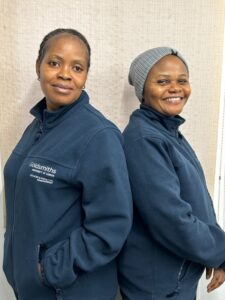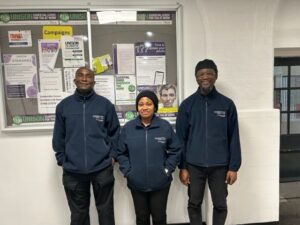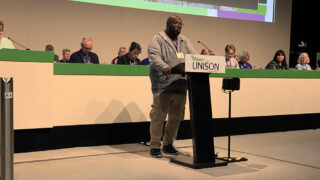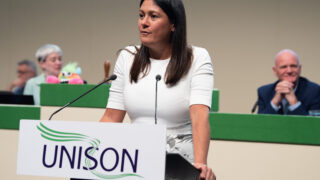In Autumn 2018, cleaners at Goldsmiths College, University of London, celebrated the news that the employer had confirmed their jobs would be brought back in-house. The move followed an intensive branch campaign and benefited around 100 cleaners.
As part of the national campaign to encourage and support insourcing, Bringing Services Home, Goldsmiths branch secretary Sheila Faucher looks back at the victory, what made it successful, and the lessons she has learnt from the experience.
Gaining trust
The campaign started in response to a restructuring proposal, which would have seen a change in working patterns for cleaning staff who were employed by private contractor ISS. The proposal effectively closed down the night shift, meaning a reduction in hours for the outsourced cleaners.
The cleaning workforce contained a high proportion of migrant workers. These were low-paid staff on precarious contracts, and many were fearful of engaging with a union in case of repercussions.

Sheila (above) says: “I had to gain the trust of the workforce, which took a number of weeks. I used to go there at around 11pm when they were starting work and then, slowly, people started to come and talk to me.”
Gaining the trust of the workers is important for several reasons. It makes it easier to recruit members and reps within the workforce, and to gather support and momentum for the campaign.
It also provides a good source of information. “I used to have 10 or 12 people waiting for me when I turned up,” says Sheila. “By gaining that level of trust you get to find out what the outsourced company is telling their staff. If you know what’s being said, you can get in between it and break it down a little and start to dispel the myths.”
Mutual understanding
Sheila also highlights an underappreciated side effect of gaining trust and building relationships – understanding the workforce and the lives they lead. To run a successful campaign, she says: “It’s not just a matter of giving out leaflets. You’ve got to understand the people and that it’s not only within the workplace that they’re struggling.
“They will tell you about their housing, they will tell you about other financial difficulties they’re having, and you’ve got to be aware of those things. You’ve got to have an idea that it’s not just about what’s happening within the workplace. It’s going to be a wider social issue.”
This also allowed the branch to take anonymous testimonies to use in the campaign which, according to Sheila, “were quite powerful, because they let the wider community within the university really understand that, although it was small wage, it was actually supporting not just the immediate family, but the member’s extended family in another country.”
She continues: “The other important thing is language. We’re talking about people that, generally, are migrants. People are coming to you and speaking in broken English, and you can just about communicate, but if you’re speaking in their language you can convey something that’s very different.
“So, at the TUPE transfer meetings we had translators. It would have been good for me to have thought of that really early on. I think that may have helped with the speed of getting people on board.”
The TUPE transfer is only the first step
Bringing the cleaners onto the same terms and conditions was a major driver for the campaign. It particularly benefited workers around their annual leave entitlement, health and safety and sick pay. Sheila says that, before the transfer, the workers would often “feel compelled to go back into work after minor ops” or “not be allowed to recover fully if they were ill or injured.”
After the transfer, there was an influx of workers needing to see occupational health due to the lack of support through the years of private contractors. “You’ve got a group of people, some of them are ageing, and you have an occupational situation where you have to ask if some of them can work within areas that they can manage.”
Another issue that has been in contention since the transfer is flexible working, specifically for workers with children. “I’ve been supporting a woman who’s going to go in for the third time to request flexible working, because it was refused the first and second times. This person has younger children, the childcare had fallen through, so it’s very, very difficult for her.”
In insourcing campaigns, it can often be difficult to sustain membership after the issue is resolved. At Goldsmiths, Sheila notes that: “Maybe a year or so later, the same people are coming to me with a problem and when you ask, ‘What’s your union membership?’, you find it’s either been frozen or it’s lapsed and you have to quote the four-week rule.
“Because they’re on the low grades – in this case, the lowest grade in the institution – and with the cost of living, it’s really difficult.”
She highlights that it’s essential to continue to engage with the membership and the issues they face after the transfer.
One success leads to another
After the cleaners were transferred back in-house at Goldsmiths, the branch also started a campaign to transfer security services back in-house. Shelia highlights how, having already been through the process with the cleaning staff, it was an easier campaign.
“With the cleaners, we had meetings where things were not always very ‘pretty’ with management. And that’s understandable, but I think that meant we had already laid the groundwork for the security campaign.”
With the increased visibility around the cleaners’ campaign and its success, the campaign to bring security staff back in-house drew significant support from staff and students at the university.
Around 50 new staff positions were created and the staff were brought back in-house at the end of the contract in January 2020.
Some of the reps and stewards recruited during the campaign

L-R: Kemi Adeyeye and Sarah Akapo

L-R Baffour Kwatia, Faustina Darling, Amaniampong Atakaroaa









One thought on “Bringing services home”